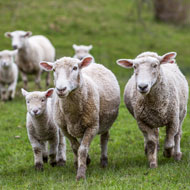
Researchers call for greater collaboration between farmers and vets
Researchers have reported resistance to one of the most common veterinary medications used to treat sheep scab.
Writing in Vet Record (Vol 182, No 4) researchers confirm the first quantitative evidence of resistance to moxidectin - a macrocyclic lactone used for the control of parasites in sheep.
The researchers used a laboratory assay to compare the toxicity of moxidectin against sheep scab mites from four farm populations where failure of treatment had been reported. They found that, when exposed to the moxidectin, the mites showed significantly low levels of mortality, compared to mites from sheep that had never been treated.
Speaking to Vet Record, study author Richard Wall explained the significance of the findings: “Although we’ve just shown resistance to only one chemical, it’s almost certain there will be cross-resistance to the macrocyclic lactones used to treat sheep scab, increasing the pressure on the organophosphate treatment diazinon, where resistance has already been described.”
Sheep scab is a major welfare concern and a source of substantial economic loss. Its prevalence has increased rapidly in recent years and management is dependent on a small number of acaricidal formulations.
Commenting on the study, Valentina Busin from the University of Glasgow told Vet Record that for effective control of the disease, there needs to be more collaboration between farmers, vets and the industry.
“Treating a sheep scab outbreak as a single entity will not allow for real control of the disease," she said. “Efforts should instead be put towards coordination, both at regional and national levels, to make sure that not only all animals are properly treated, but neighbouring farms are aware of the situation and the likely source of infestation can be identified.”



 The Federation of Independent Veterinary Practices (FIVP) has announced a third season of its podcast, Practice Matters.
The Federation of Independent Veterinary Practices (FIVP) has announced a third season of its podcast, Practice Matters.